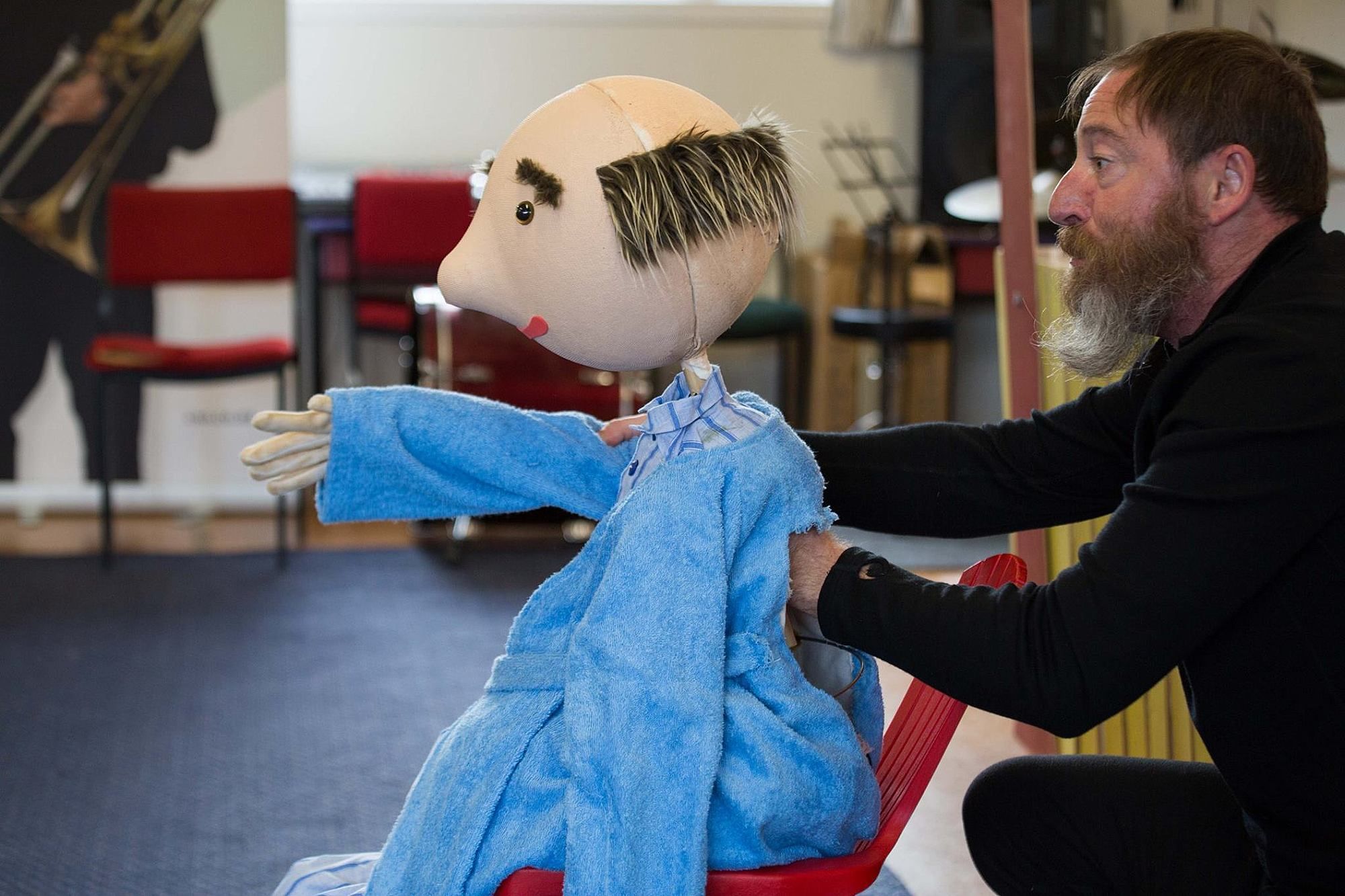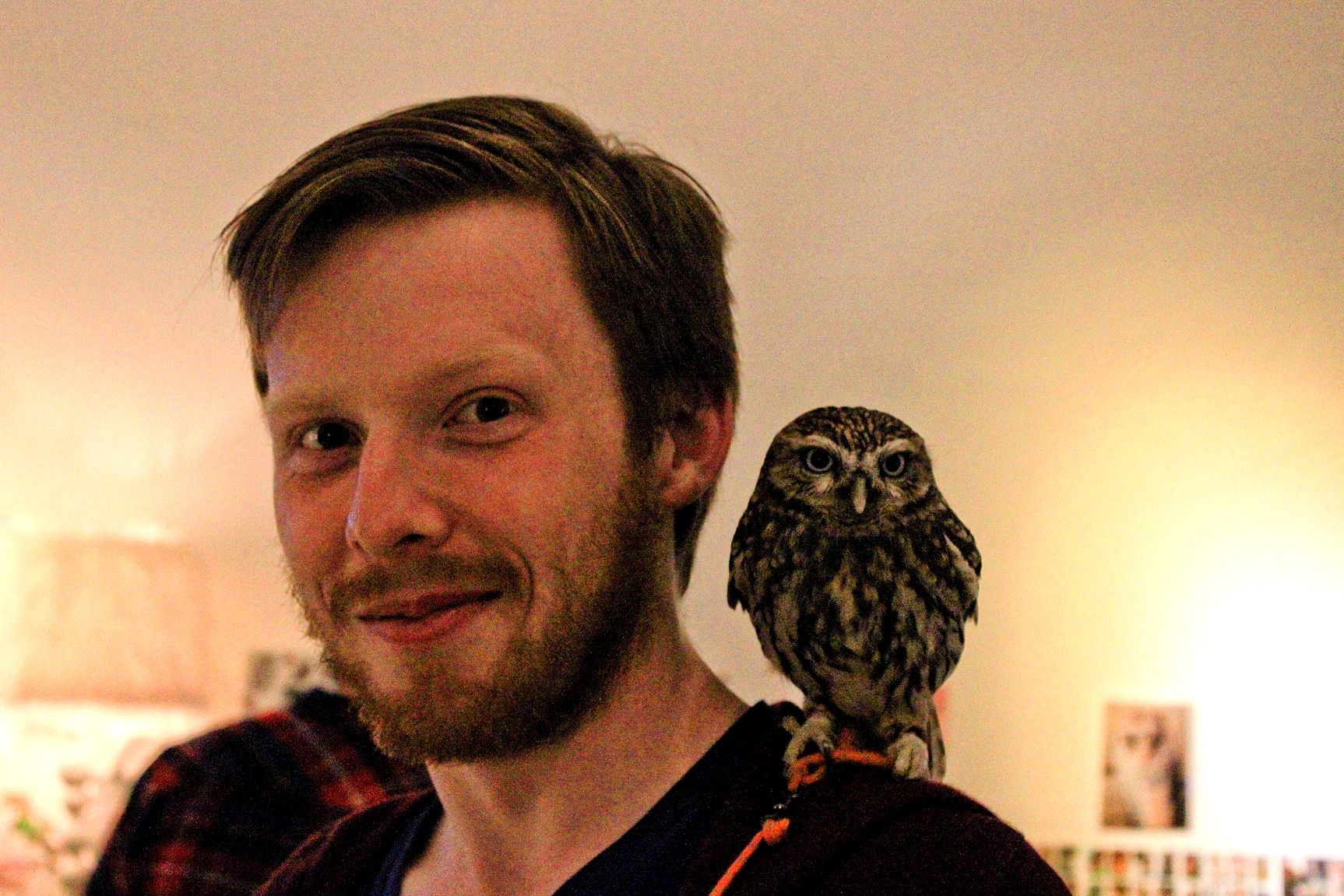The Magical Mundane: A Review of Wilfrid Gordon McDonald Partridge
Little Dog Barking Theatre Company adapts Mem Fox and Julie Vivas' beloved picture book for early childhood audiences. Former early child Adam Goodall considers its warmth, its sadness and the way it talks to children.
There’s a heckler tonight. He’s wearing a blue polar fleece and standing in his seat, animated and yelling about ballet. I can’t make out the specifics because Peter Wilson, the only performer on stage, is also talking, scuffling around behind a puppet of an old woman and trying to get past the distraction. The heckler can’t be more than four years old.
The story soon moves past ballet and the heckler quiets down, the only major interruption on the night I see Wilfrid Gordon McDonald Partridge (I’m calling it Wilfrid from here on out, more for my fingers’ sake than anything else). That’s pretty remarkable, given this is a show geared at early childhood audiences. It’s also the most appropriate mark of success possible for this charming piece of puppetry given what it’s trying to show its young audience – that there’s value in listening, and nothing more valuable than reaching out to someone and telling them you want to listen to them.
The latest puppet work from theatre company Little Dog Barking, this time with Lyndee-Jane Rutherford in the director’s chair, Wilfrid is likely to be familiar to many parents and grandparents given its beloved source material. Mem Fox’s picture book, filled with Julie Vivas’ oddly-proportioned, ruddy-faced illustrations, follows an inquisitive ginger boy named Wilfrid. Wilfrid lives next to a rest home and loves listening to the stories eagerly shared by the home’s quirky residents. Those stories are the biggest difference between the source material and this adaptation.
In the book, the residents are brought to life through an illustration and a line of description, Fox and Vivas suggesting their lives more than anything. In this adaptation, co-writers and performers Wilson and Kenny King take those suggestions and build on them, emphasising the residents’ rich past lives and lost passions in short, focussed vignettes. Miss Jordan who plays the organ was a child prodigy, picking up instruments as quick as she could learn them; Mr Drysdale who had a voice like a giant used to be a farmer, and calls to an imaginary dog as a joke; Miss Mitchell with the wooden stick was once a ballet dancer, now hobbled by the capricious march of time.
Wilfrid’s not as interested in them as he is in Miss Nancy Delacourt Cooper, a perpetually silent 96 year old woman who carries an empty suitcase around. Wilfrid’s parents pity the “poor old thing” who’s “lost her memory”, and so Wilfrid embarks on a quest to unlock Miss Nancy’s memories and get her to talk – assuming he can work out what a memory is first. From here, Wilson and King pretty much follow the book beat for beat. After all, why fix what’s already so adored that West Wing actor Bradley Whitford will gladly read it for the internet?
These characters are charming and they draw us into their memories; like Wilfrid, we’re willing listeners who value their time and their pasts.
The story’s a perfect fit for Little Dog Barking. Since 2010, the company has specialised in puppetry and mask for children that’s gentle, sweet and infused with a surprisingly mature sense of melancholy. Their 2013 adaptation of Wolf Erlbruch’s Duck, Death and the Tulip, about an inquisitive duck who makes friends with a delightful little skeleton in pyjamas, remains the high watermark of this style. I quietly cried through the last few minutes of its remount at BATS last year, trying to hide it from the children in the front rows.
Like Duck, Death and the Tulip, Wilfrid is warm and pokes good-hearted fun at its characters’ quirks. Mr Hosking, who tells scary stories, shakes his head like a horse as he blathers on about how kids these days only ever play their X-Stations and Playboxes, while Miss Jordan brags about being the first to play the slide trombone in her school, dragging out the vowels like the instrument’s talking through her. These characters are charming and they draw us into their memories; like Wilfrid, we’re willing listeners who value their time and their pasts.
That compassion adds weight to their later, more plaintive reminiscences, like Miss Nancy’s memory of her brother lost in war or Mr Drysdale’s homesickness for the farm and his old dog Blue (a surprising and welcome touch of Owen Marshall there). They’re familiar to us, we’re close to them, and the pain of loss stands out more when set against lives of passion and joy. Wilfrid’s episodic structure – framed as a memory itself, told by an elderly Wilfrid looking back at his childhood – means that it doesn’t have the steady, assured build of Duck, Death and the Tulip, nor the exquisite catharsis of that show’s final moments. It’s doing a different thing, though, talking to the children in its audience through sustained monologues and trying to level with them, connecting through the hopes, interests and experiences that the children share with the elderly puppets. It’s good at that.
There are rough edges, though it would be a shame for them all to be sanded down. In contrast with the small and gangly Wilfrid, a more traditional and simple puppet, the old folk are brought to life in rickety, awkward-looking puppets about two-thirds the size of their performers. Wilson and King slide their feet into slippers and their fingers into little bands on their puppets’ palms, moving these rickety frames topped by large, ovaloid heads with small, simple faces. These designs, channelling the child’s-eye view of Vivas’ illustrations, have their own wonky charm, and Wilson and King are such accomplished puppeteers that each old man and woman shuffles and aches with a slightly different personality.
Other pieces of the production could stand to be refined: Stephen Gallagher’s thin and whimsical score is limited by its drum loops and its sparse use in the play, and a number of the shadow puppet symbols from the old folks’ pasts are perfunctory and not particularly good-looking, whether it’s because they’re oddly cut or because of the designs themselves. Those aside, Wilfrid Gordon McDonald Partridge has a magical mundanity to it, an endearing tale of listening and connecting with others that’s told with charm and an appropriate sense of gravity. And if the rapt under-5s in the audience are any indication, it’s not only endearing, but incredibly effective at bridging the gap between its young audience and these boooooring old people.
Wilfrid Gordon McDonald Partridge ran at
BATS Theatre, Wellington
from Wednesday 19 April to Saturday 22 April
For more information about Wilfrid Gordon McDonald Partridge, which will be playing at schools and early childhood centres throughout the year, go here.

